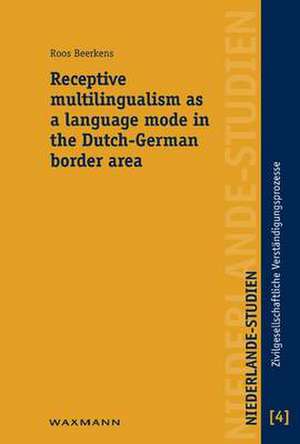Receptive multilingualism as a language mode in the Dutch-German border area: Zivilgesellschaftliche Verständigungsprozesse vom 19. Jahrhundert bis zur Gegenwart, cartea 4
Autor Roos Beerkensen Limba Engleză Paperback – 31 mai 2010
Preț: 250.46 lei
Nou
Puncte Express: 376
Preț estimativ în valută:
47.93€ • 49.44$ • 39.99£
47.93€ • 49.44$ • 39.99£
Carte indisponibilă temporar
Doresc să fiu notificat când acest titlu va fi disponibil:
Se trimite...
Preluare comenzi: 021 569.72.76
Specificații
ISBN-13: 9783830923466
ISBN-10: 3830923465
Pagini: 330
Dimensiuni: 156 x 233 x 33 mm
Greutate: 0.5 kg
Editura: Waxmann Verlag GmbH
Seria Zivilgesellschaftliche Verständigungsprozesse vom 19. Jahrhundert bis zur Gegenwart
ISBN-10: 3830923465
Pagini: 330
Dimensiuni: 156 x 233 x 33 mm
Greutate: 0.5 kg
Editura: Waxmann Verlag GmbH
Seria Zivilgesellschaftliche Verständigungsprozesse vom 19. Jahrhundert bis zur Gegenwart
Notă biografică
Roos Beerkens, born 1983, studied Communication Studies in Utrecht and in Aarhus. She was awarded summa cumma laude for her PhD in January 2010 as a member of the DFG-research training group 'Negotiating processes of the civil society from the 19th century to the present - Germany and the Netherlands compared' at the Westfalian-Wilhelms University in Münster. Currently she works as a communication consultant at Involve in Nijmegen (the Netherlands), where the focus is on internal communication in a range of different organisations.










